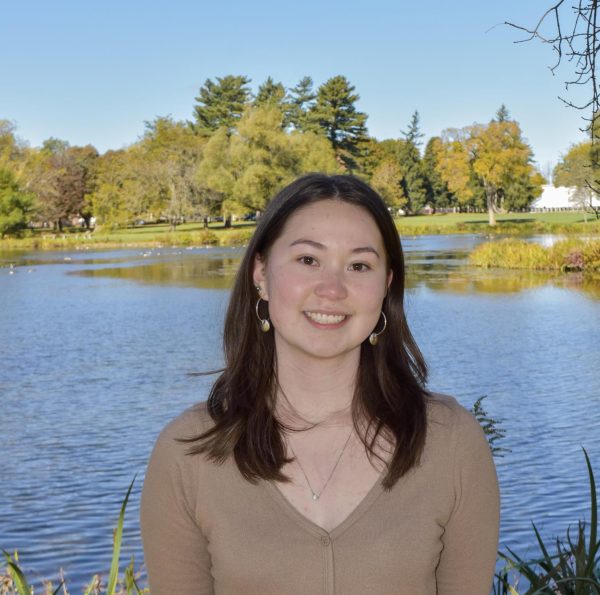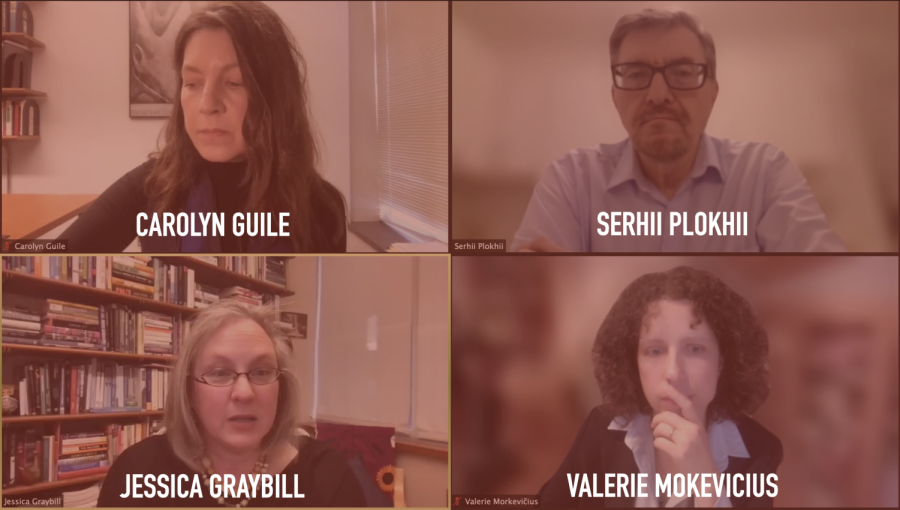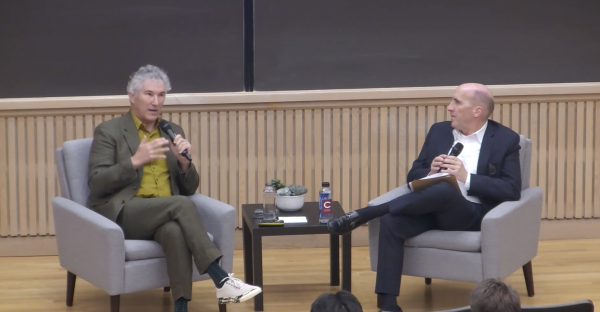Center for Freedom and Western Civilization Hosts Discussion on Ukraine Crisis
The Center for Freedom and Western Civilization hosted Mykhailo S. Hrushevs’kyi, professor of Ukrainian history, and Serhii Plokhii, director of the Ukrainian Research Institute at Harvard University, on Tuesday, Feb. 5 to speak about the current crisis in Ukraine.
Harvard Professor Plokhii joined Colgate professors Jessica Graybill, Valerie Morkevičius and Carolyn Guile to participate in a discussion about the current state of Ukrainian politics and the effects on the world.
Guile, associate professor of Art & Art History and Russian and Eurasian Studies, director of the Medieval & Renaissance studies program and co-director of the Center for Freedom & Western Civilization, shared that she and the Center for Freedom and Western Civilization felt it was necessary to foster conversation around the situation that continues to shift each day.
“We thought, we’ve got to do something [about] Ukraine and Belarus, and this simmering situation as things are changing so much […] at the Ukrainian border,” Guile said. “We got our schedules together […] and [Plokhii] said yes […] and we’ve been putting it together day by day to figure out the best questions.”
Harvard Professor Plokhii began with a talk about the history of Russian-Ukrainian relations, the fate of the other Baltic states in relation to the outcome in Ukraine and how this affects the world at large.
Plokhii highlighted the history of tension between Russia and Ukraine. Russian President Vladimir Putin currently views Ukrainians as Russians and continues to undermine their legitimacy as a state and as a people, according to Plokhii. But, because of its borders, Ukraine was historically divided into a more Ukrainian speaking West and a more Russian speaking East. It wasn’t until the first Russian invasion in 2013 that the country began to find its national identity.
Ukraine also represents the breaking point of the Soviet Union, having gained its independence in 1991 one week before the collapse. According to Plokhii, “Soviet leaders couldn’t imagine the Soviet Union without Ukraine.”
Plokhii emphasized that there is “more at stake than just Ukraine” in this crisis and applauded United States President Joe Biden for statements he made earlier this week in what she referred to as “the strongest address […] in the last 30 years” on the topic. Biden communicated that the United States and NATO will ‘support Ukraine with military action’, and that the withdrawal of Russian troops from Ukrainian territory won’t last forever. If Russia attacks, Ukraine will defend itself, Plokhii said.
Near the end of Plokhii’s talk, Professor Graybill, Associate Professor of Russian and Eurasian Studies; Director, Russian and Eurasian Studies Program, joined Professor Morkevičius, Associate Professor of Political Science, along with several students, to ask and answer questions. These questions led to a more in depth discussion about Ukrainian President Volodymyr Zelenskyy and his responsibility to the people of Ukraine, as well as their wishes regarding NATO. Graybill, associate professor of Russian and Eurasian studies and director of the Russian and Eurasian studies program, questioned what the consequences of peace would be to the people of Ukraine and prompted Plokhii to talk through alternative solutions to Ukraine aligning with NATO. Morkevičius, associate professor of political science, also questioned a new form of media warfare in Ukraine that led Plokhii to discuss Russia’s media strategy in Ukraine and how it is becoming less impactful today.
After the discussion, first year Caroline Collins shared that she found “the pride of all of these countries to be a huge part of the conflicts in the area…and the subsequent cultural divides to be a large part in their inability to compromise.”
Plokhii’s panel at Colgate was heavily anticipated by faculty and students alike, and Guile spoke about how the relationship of historical identity to current political developments like the one seen in Ukraine, “will help students understand a region…in European studies traditionally speaking, that is not often taught.”

Samantha Wotring is a senior from Houston, Texas, majoring in English creative writing and history. She has previously served as an Assistant News Editor...





